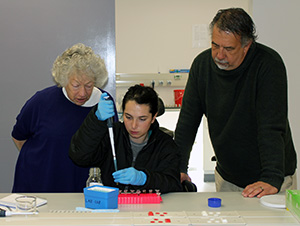Latest News Archive
Please select Category, Year, and then Month to display items
01 February 2024
|
Story Lacea Loader
|
Photo SUPPLIED
 Prof Prince Ngobeni, newly appointed Campus Principal of the UFS Qwaqwa Campus.
Prof Prince Ngobeni, newly appointed Campus Principal of the UFS Qwaqwa Campus.
The University of the Free State (UFS) has appointed Prof Prince Ngobeni as Principal of the Qwaqwa Campus as from 1 February 2024.
Prof Ngobeni completed his first qualification in Analytical Chemistry at the then Technikon North-West before furthering his studies at the then Technikon Pretoria. He completed a DTech in Chemistry at the Tshwane University of Technology (TUT) in 2003. In 2016, he enrolled for a Doctor of Business Administration in Higher Education at the University of Bath in England.
His lecturing career began at TUT in 1995 where he progressed from Head of Department: Chemistry in 2003 to Associate Dean: Faculty of Science in 2010, before being appointed as Executive Dean of the Faculty of Sciences at TUT in 2015 – a position he held until 2023. He also served as Interim Campus Rector of TUT’s Pretoria Campus from 2018 to 2020.
“With extensive years of academic leadership experience, Prof Ngobeni has the experience required to guide the Qwaqwa Campus towards the university’s Vision 130. The campus is already recognised as a leader in some of its unique research fields, and Prof Ngobeni’s strong research background will be valuable in this regard,” says Prof Francis Petersen, Vice-Chancellor and Principal of the UFS.
Prof Ngobeni is a member of several professional bodies in his field of expertise, including MatTEK at the Council for Scientific and Industrial Research (CSIR), the South African Chemical Institute (SACI), the Society for Atomic Spectroscopy, and the South African Council for Natural Scientific Professions (SACNASP). During his career, he has also secured research funding for individual projects and international partnerships. Prof Ngobeni also initiated chemistry practical sessions for local schools and participated in the Technology Station in Chemicals project, which offers a wide range of services designed to assist small and medium enterprises (SMEs) in the chemical sector.
His substantial list of publications in journals and books covers a range of chemistry-related and managerial topics. He is also a well-versed presenter at local and international conferences.
“The Qwaqwa Campus has experienced major developments in recent years; I look forward to further contributing to the growth of the campus and to support the university in achieving its Vision 130,” says Prof Ngobeni.
Monkey research attracts international attention
2016-07-11

Prof Trudy Turner from the University of
Wisconsin-Milwaukee and Prof Paul Grobler
from the Department of Genetics at the
University of the Free State, together with one
of the students researching monkey genes.
Photo: Siobhan Canavan
For this year’s Summer School programme, Prof Paul Grobler, from the University of the Free State Department of Genetics focuses on research about the conflict between monkeys and humans in areas where monkeys are regarded as problem animals.
Global expert part of research
This year, Prof Grobler is hosting a group of students and lecturers from the United States of America (USA). The group includes Prof Trudy Turner from the University of Wisconsin-Milwaukee (UWM), a global expert on vervet monkeys. She has been working with the Department of Genetics at the UFS for the past fifteen years, and has also been appointed as an Affiliated Professor in the department.
“The Summer School programme is an opportunity for the American Primatology students to gain practical experience in Africa,” says Prof Grobler.
International interest in Summer School
This year’s Summer School programme involves four lecturers and nine students. The lecturers are from the University of Wisconsin-Milwaukee (UWM), the University of California, Los Angeles (UCLA), Boston University, and Central Washington University.
“We use the genetic information to determine
how monkeys historically infiltrated the
different areas in South Africa.”
This year’s focus is on the genetic structure of the monkeys in South Africa, and research that is being done on the differences and similarities in monkeys from different areas. “We use the genetic information to determine how monkeys historically infiltrated the different areas in South Africa,” says Prof Grobler.
Local nature reserve acting as host
The group will perform field work, including observing monkeys in the Soetdoring Nature Reserve, as well as laboratory work in the department, where they will be assisted by two laboratory technicians.
Two years ago, Prof Grobler and his department tested this idea on a smaller scale, and now they hope to make this a regular event.